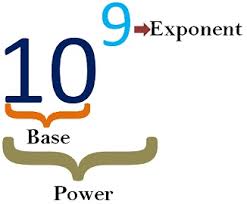To save your time, we've compiled all the essential formulas to know for the GRE, so you could just jump right at it and start your GRE prep.
Perfecting the GRE Quantitative: Become an Exponents Expert
 Like the thousands of other humanities people getting ready to take the GRE, you may not have thought about exponents since high school. You probably spent your undergraduate years thinking a lot more about existentialism than exponents, and now need to feel confident enough about that tiny superscript number to work with it over and over again on the GRE.
Like the thousands of other humanities people getting ready to take the GRE, you may not have thought about exponents since high school. You probably spent your undergraduate years thinking a lot more about existentialism than exponents, and now need to feel confident enough about that tiny superscript number to work with it over and over again on the GRE.
The good news is that, like with so much high school math you find yourself needing to review for this graduate school entrance exam, there are a lot of great resources online for review and practice. This article will quickly explain the ways you may see exponents appear on the test, the basics you will need to learn, and good places to look for practice.
Exponents Are All Over The Quantitative Section of the Exam
If you have already taken one of the free GRE practice tests offered by ETS, you are likely familiar with the fact that every subsection includes questions about exponents. You will see some situations where you simply have to calculate an exponential number and some where you have to solve an algebraic equation.
The good news is that once you review and know your exponent rules inside out, none of these questions will be particularly difficult. These are the major concepts involving exponents that you will see on the test:
- Combining like terms, such as in the expression 3x2 + 4x – 7x2 – 1
- Calculating the value of an exponential number such as 1251/2 43
- Simplifying a multivariable expression like (x4y2z)7 / x2y3
- Factoring a quadratic expression such as x2 – 64
What Should I Review?
First things first, know the exponent rules like the back of your hand. These include:
- Multiplying two exponential numbers with the same base, such as a6 a11
- Dividing two exponential numbers with the same base, such as a11 / a6
- Applying a second exponent to an exponential number, such as (a2)10
- Simplifying a number with a fraction in the exponent, such as 161/3
- Simplifying a number with 0 in the exponent, such as a0
If any of those rules look at all unfamiliar to you, or if you don’t know how to complete those operations by instinct, review and student your exponent rules using this great worksheet on Math-Aids.com.
You should also go ahead and review factoring quadratics if that’s not familiar to you. Purple Math has a great post on the topic.
How Should I Practice?
First, learn these concepts inside and out. There are two main sources for quality practice. The first is Math-Aids.com, which has tons of practice problems for exponents and radicals. That site automatically generates worksheets of drills that you can use to practice not just your exponent rules, but any math fundamental that you feel could use some more attention.
The free OpenStax textbooks provided by Rice University are also a trove of practice problems. They are, admittedly, a little annoying to navigate, but they are full of quality practice problems. Of course, these are ‘real deal’ text books, so they also include the actual lessons about math concepts. This makes the OpenStax books fantastic review resources.
Also, visit MathBlog.com for helpful articles on tons of mathematical concepts.
Next, practice some GRE questions. The best way to learn how to apply exponents to the GRE is to actually do it! ETS’s PowerPrep software includes a total of three practice tests, and this will give you a great sense of what you need to strengthen when it comes to your skills with exponent rules. If you want extra GRE problems, just go to your local library or book store and leaf through some GRE prep books to choose the one that has the most practice problems.
Additionally, consider working with a tutor. A quality tutor will not just teach the concepts you need to relearn, but focus on the specific points you’re struggling with and make you plenty confident about the math for test day. That tutor will also have plenty of wisdom about the Quantitative section, and can offer you test-taking strategies to reduce the amount of calculation and brain work you need to succeed on the GRE.
About the Author
Mike S. is one of our most experienced GRE tutors. For more information on our GRE prep packages, click here.
